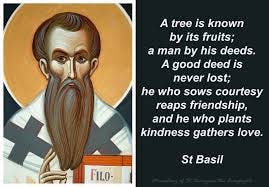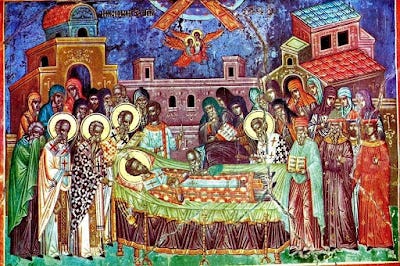Wisdom of Solomon 4, 6, 7, 2 (Vespers, 3rd reading)
1 When the righteous is praised, the people rejoice: For his memory is immortality, since it is known both by the Lord and by men, for his soul was pleasing to the Lord. Therefore love wisdom, O men, and live. Desire her and be instructed: For her beginning is love and the keeping of her laws. Honor wisdom that you may reign forever.
2 I will tell you and not hide the mysteries of God from you. For He is the Guide of wisdom, the Corrector of the wise and the Artisan of all thoughts and deeds. Wisdom will teach with all understanding: For in her is a Spirit, intelligent and holy, the Radiance of the Everlasting Light and the Image of the Grace of God.
3 She fashions friends of God and prophets. For she is more beautiful than the sun and above all the order of the stars. Compared with the light she is found to be first. She delivered from infirmities those pleasing her and guided them on the paths of righteousness. She gave to them understanding to be holy and to preserve them from those who would ensnare them, and she granted them strength in struggles, so that all might understand that the most powerful of all is piety, and that evil might not prevail against wisdom, nor judgment pass away without convicting the wicked.
4 Having reasoned unrighteously, they said to themselves, “Let us oppress the righteous man and not spare his venerableness, nor let us be ashamed of the gray hairs of the old man of many years. But let our might be our law and let us seize the righteous, because he is inconvenient to us and is opposed to our deeds; he reproaches us for apostasy against the law and divulges the sins of our training.
5 “He declares to us to have knowledge of God and calls himself a child of the Lord. He became to us a reproof of our thoughts; the very sight of him is a burden to us, because his life is unlike that of others, and his ways are very different. We are considered by him to be an insult, and he avoids our ways as unclean; he calls the end of the righteous blessed.
6 “Let us see if his words are true; let us test him to see what will happen to him. Let us torment him with revilement and tortures, that we may understand his meekness and test his guilelessness. Let us condemn him to a shameful death, for, according to his own words, he shall be respected.”
7 Thus they reasoned, but were deceived, for their wickedness blinded them. They did not know the mysteries of God, nor did they discern that Thou alone art God, having the power of life and death: Who savest in times of affliction and deliverest from every evil; Who art compassionate and merciful, granting Grace to His venerable ones, and opposing the proud with His arm.
Mark 10:46-52 (Gospel)
46 Now they came to Jericho. As He went out of Jericho with His disciples and a great multitude, blind Bartimaeus, the son of Timaeus, sat by the road begging.
47 And when he heard that it was Jesus of Nazareth, he began to cry out and say, “Jesus, Son of David, have mercy on me!”
48 Then many warned him to be quiet; but he cried out all the more, “Son of David, have mercy on me!”
49 So Jesus stood still and commanded him to be called. Then they called the blind man, saying to him, “Be of good cheer. Rise, He is calling you.”
50 And throwing aside his garment, he rose and came to Jesus.
51 So Jesus answered and said to him, “What do you want Me to do for you?” The blind man said to Him, “Rabboni, that I may receive my sight.”
52 Then Jesus said to him, “Go your way; your faith has made you well.” And immediately he received his sight and followed Jesus on the road.
Translation of the Relics of St. John Chrysostom, Archbishop of Constantinople (438)
Saint John Chrysostom, the great ecumenical teacher and hierarch, died in the city of Comana in the year 407 on his way to a place of exile. He had been condemned by the intrigues of the empress Eudoxia because of his daring denunciation of the vices of those ruling over Constantinople. The transfer of his venerable relics was made in the year 438, thirty years after the death of the saint, during the reign of Eudoxia’s son emperor Theodosius II (408-450).
Saint John Chrysostom had the warm love and deep respect of the people, and grief over his untimely death lived on in the hearts of Christians. Saint John’s disciple, Saint Proclus, Patriarch of Constantinople (434-447), during services in the Church of Hagia Sophia, preached a sermon praising Saint John. He said, “O John, your life was filled with sorrow, but your death was glorious. Your grave is blessed and reward is great, by the grace and mercy of our Lord Jesus Christ O graced one, having conquered the bounds of time and place! Love has conquered space, unforgetting memory has annihilated the limits, and place does not hinder the miracles of the saint.”
Those who were present in church, deeply touched by the words of Saint Proclus, did not allow him even to finish his sermon. With one accord they began to entreat the Patriarch to intercede with the emperor, so that the relics of Saint John might be brought back to Constantinople.
The emperor, overwhelmed by Saint Proclus, gave his consent and gave the order to transfer the relics of Saint John. But those he sent were unable to lift the holy relics until the emperor realized that he had sent men to take the saint’s relics from Comana with an edict, instead of with a prayer. He wrote a letter to Saint John, humbly asking him to forgive his audacity, and to return to Constantinople. After the message was read at the grave of Saint John, they easily took up the relics, carried them onto a ship and arrived at Constantinople.
The coffin with the relics was placed in the Church of Holy Peace (Hagia Eirene). When Patriarch Proclus opened the coffin, the body of Saint John was found to be incorrupt. The emperor approached the coffin with tears, asking forgiveness for his mother, who had banished Saint John. All day and night people did not leave the coffin.
In the morning the coffin was brought to the Church of the Holy Apostles. The people cried out, “Father, take up your throne.” Then Patriarch Proclus and the clergy standing by the relics saw Saint John open his mouth and say, “Peace be to all.” Many of the sick were healed at his tomb.
The celebration of the transfer of the relics of Saint John Chrysostom was established in the ninth century.
Orthodox Chant: Slavic Byzantine Liturgy of St. John Chrysostom
Choir of 'Christian Russia', Milan Live recording made in Milan on 6 November 1988. Sunday XXIV of the Year, VII tone. Priest celebrant: Father Romano Scalfi Deacon: Father Denis Guillaume osb Reader: Father Stefano Caprio Conductor: Father Ludwig Pichler sj
This week’s calendar reminders:
Monday 1/27: Matins 8:30 am
Tuesday 1/28: no services or events
Wednesday 1/29: no services or events
Thursday 1/30: Matins 8:30 am
Friday 1/31: Matins 8:30 am
Saturday 2/1: Catechumen Class 4:30; Choir Rehearsal 5 pm; Great Vespers 6 pm
Sunday 2/2: Divine Liturgy 9:15am
CLICK BELOW to donate online:
Christ the Savior Orthodox Church is located in Southbury, Connecticut, and is part of the New England Diocese of the Orthodox Church of America.
Mailing address: Christ the Savior Church, 1070 Roxbury Road, Southbury, CT 06488
PLEASE DONATE to help our parish do the work of the Lord, thrive and grow, and extend the Kingdom of God. May the Lord bless your generosity!
Fr. Moses Locke can be reached at frmoseslocke@gmail.com










